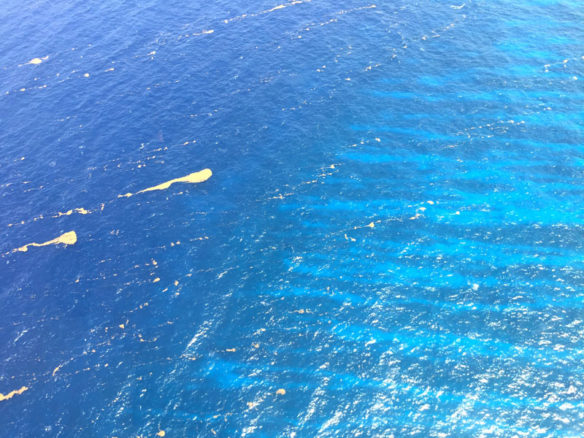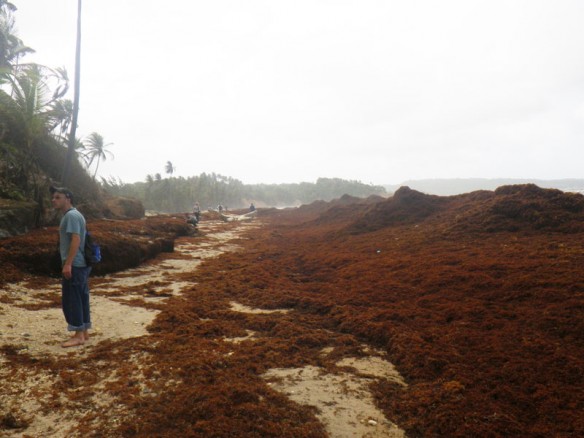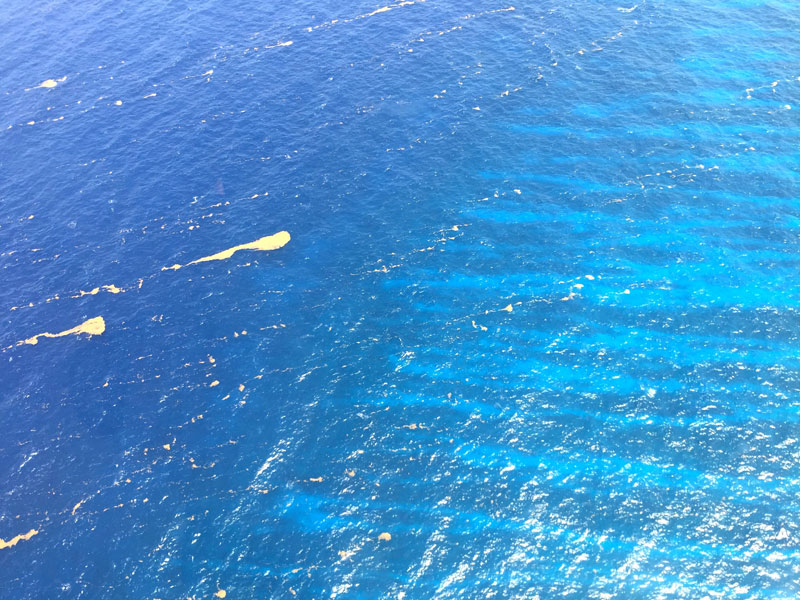
Floating mats of sargassum across the Caribbean sea. Photograph: © SAF — Coastal Care.
The actual sargassum route and cycle are not well known, but volume does seem to be increasing with each season’s cycle; theories for this include increasing heat and/or additional nutrients introduced into the Atlantic that create or enhance massive blooms of this foliage. Recent research also suggests that Atlantic algae responds positively to increased C02 and acidity in seawater, a major change in the former theory of slower growth.
Excerpts;
When waves of sargassum – a type of seaweed – washed up on Eastern Caribbean shores seven years ago, people hoped it was a one-off. Matted piles swamped coastlines from Tobago to Anguilla.
Years later the seaweed keeps on washing ashore, in larger quantities, and everything suggests 2018 could be the worst year yet…
Read Full Article, BBC News (08-06-2018)
Mysterious masses of seaweed assault Caribbean islands; Science Mag (06-11-2018)
The Caribbean is bracing for what could be the mother of all seaweed invasions, with satellite observations warning of record-setting Sargassum blooms and seaweed already swamping beaches…
The Eastern Caribbean Is Swamped by a Surge of Seaweed; Hakai Magazine (06-11-2018)
Massive rafts of floating sargassum are killing wildlife and preventing fishers from launching their boats…
Sargassum Watch Warns of Incoming Seaweed; (09-06-2016)
Sargassum beaching events in the Caribbean, West Africa, and other regions have received wide media attention, prompting action by regional governmental agencies and environmental groups seeking to understand this new phenomenon…
Plaguing Paradise; The Economist (09-02-2015)
Smelly piles of seaweed are ruining holidays. Globs of sargassum seaweed have landed on Caribbean beaches this year, forming piles that are sometimes metres deep…
Sargassum Inundates the Beaches of the Caribbean; Mission Blue, Sylvia Earle Alliance (10-31-2014)
Massive amounts of pelagic sargassum have ben washing up on Carribean beaches for the past few months. According to Mission Blue friend Martha Gilkes of Antigua, the seaweed drifts are getting as high as 3 to 4 feet on some beaches…
Mexico Deploys its Navy to Face its Latest Threat: Monster Seaweed, The Washington Post (10-29-2015)
A Tale of Two Beaches: Tompire Bay, NE Trinidad; By John Weber, William Neal & Jeanette Arkle

Trinidad, West Indies. Giant wrack-line of Sargassum. Height here exceeded 2 m. The wall was definitely a barrier to nesting turtles. Captions: A Tale of Two Beaches: Tompire Bay, NE Trinidad; By John Weber, William Neal & Jeanette Arkle. Photo courtesy of: © Jeanette Arkle.









